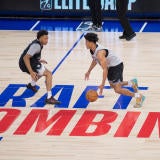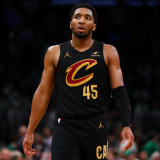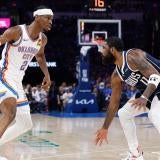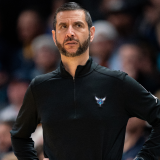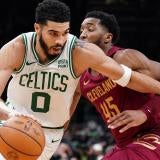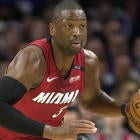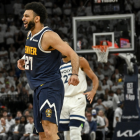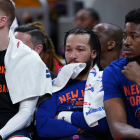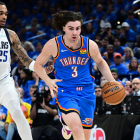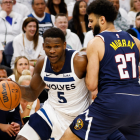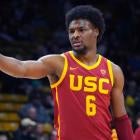A well-known NBA face will be stalking the sidelines during the inaugural Jr. NBA World Championship at the ESPN Wide World of Sports Complex at Walt Disney World Resort near Orlando, Fla. next week
As 16 of the best boys' 13- and 14-year-old teams and 16 of the best girls' 13- and 14-year-old teams from around the world will compete at the first-of-its-kind global youth tournament, Dwyane Wade – the three-time NBA champ who has developed a global following since signing with the Chinese shoe company Li-Ning in 2012 and becoming a Jr. NBA World Championship Global Ambassador – will be shouting encouragement. He'll be offering tips to these 300-some players from 35 countries. And he'll be wondering what the NBA would look like right now if these sorts of international developmental projects had been available when he joined the NBA a decade and a half ago.
"This is the purest form of basketball at this age," Wade said in a conference call Monday. "To be able to be around kids of this age, before it becomes a business, a real business, it's exciting just to watch kids go out there and give everything they have. To see them pick up things from moment to moment, from minute to minute, to watch them grow, it's just incredible. It's something that I love to do, that I love watching."
The current state of the NBA proves that a youth world championship like this is, if anything, past due.
Wade also touched on his uncertain future ("In due time; time will tell") as well as how his former teammate LeBron James will fare as a Los Angeles Laker and a combustible supporting cast ("We've all watched teams in the past that came together we didn't think could work and they worked, and teams that we thought could work couldn't work. … If they want it to work, if they want to figure it out, I think they can.") But the point of the media call was for Wade to call attention to the NBA's newest push into international basketball, one that ought to start paying real-world dividends a decade or more in the future.
The NBA's international explosion came in the years before Wade entered the NBA in 2003.
At the beginning of the 1980-81 season – the season before Wade was born – only 1.7 percent of NBA players were foreign-born. That number grew steadily but slowly until the 1997-98 season, when 7.6 percent of NBA players had international pedigree. Then came the explosion. By 2004-05, 22.1 percent of NBA players were foreign born. And it's stayed around that proportion ever since. As of opening day last season, NBA teams counted 108 international players from a record 42 countries on their rosters – 22 percent of the league. Some of the league's brightest young stars were born outside the United States, from Joel Embiid (Cameroon) to Giannis Antetokounmpo (Greece) to Nikola Jokic (Serbia) to Kristaps Porzingis (Latvia) to Ben Simmons (Australia). It was the fourth season in a row where the NBA had at least 100 international players. And 11 more international players were selected in the 2018 NBA draft, including No. 1 overall pick DeAndre Ayton (Bahamas) and No. 3 pick Luka Doncic (Slovenia).
Next week's international youth tourney is but one more piece of evidence of the internationalization of the NBA that's occurred over the past generation.
"A lot of guys from Europe are ahead of the curve," Wade said. "It's kind of like our game of basketball has kind of now changed into the style of play and the way that they've played the game for so many years, even in the NBA. … Certain players had already been ahead of the curve. You look at big guys like [Arvydas] Sabonis back in the day, you look at Vlade Divac and those guys, they could play in today's game. They started the way the NBA is going, so definitely the talent level is super high."
While the international influence on the NBA has plateaued over the past decade in terms of the proportion of international players in the league, there's reason to believe the could grow in the future because of the league's commitment not just to international scouting but to developing self-sustaining developmental youth programs abroad.
It's cliché now to think of the NBA as such an international game. After all, there are teams like the Utah Jazz and Toronto Raptors whose opening-day rosters were nearly half foreign-born players at the beginning of last season. But it's wild to think just how new of a phenomenon that actually is.
"It's changed so much," Wade said. "For me I go back to probably the (Beijing) Olympics in 2008. I think about just going over there and being a part of the team and being a part of the Kobe Bryant show and just looking at how big Kobe was. We all knew that Kobe was going to China at the time and taking these tours with Nike. We all saw it. But we didn't know how big the game was globally until we got the opportunity to go over there and play in the Olympics. Then the NBA started sending us over to different places to play in the preseason. You see the level of the game and how big it is everywhere. So for me, not only being a part of playing in an Olympics in '08 in Beijing but also being endorsed and sponsored and partnered with Li-Ning, a Chinese brand. I never even thought about that when I first came in the league, or even in 2008. And then in 2012 I was signed with the brand. Now it's almost a part of my life forever."








